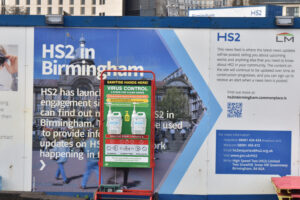
HS2 has revealed more than £2bn in costs associated with Rishi Sunak’s decision to downgrade the high-speed rail line.
The UK’s largest infrastructure project announced it had written off £1.1bn in costs incurred during “phase two,” which was intended to connect Birmingham to Manchester until the government scrapped it last year.
In its annual report, HS2 Ltd disclosed a further £1bn in accounting charges related to the project’s reduced ambitions, which will lower its expected future income. Overall, the business reported £2.17bn in one-off costs due to the railway’s scale-back.
Sunak cancelled the second leg of the HS2 project and scaled back plans for London Euston station in October last year during the Conservative party conference in Manchester. This decision, viewed as a political misstep, caused dismay in Manchester, a city that was set to benefit from the new rapid link.
The HS2 project had faced long delays and rising costs, causing its estimated price tag to balloon to £71bn. The government claimed it would save £36bn by scrapping part of the line, with Sunak pledging to reinvest in other rail projects, including Network North, to improve links between northern cities.
Originally planned as a Y-shaped line linking London with Manchester and Yorkshire, HS2 has been progressively scaled back. Boris Johnson’s government cancelled plans for HS2 to reach Leeds in November 2021. The decision to terminate HS2 in Birmingham has been met with anger in regions that were poised to benefit. Labour has stated it would not reverse the decision, with Keir Starmer acknowledging in January that it was “not possible.”
The government’s spending watchdog recently noted that the decision to axe HS2’s second leg is likely to mean higher fares on the west coast mainline from London to Manchester to discourage train travel. HS2 was intended to relieve capacity on the line, but the National Audit Office warned there could be 17% fewer seats on trains between Birmingham and Manchester due to the decision to stop the line in the Midlands.
HS2 attributed £850m of asset write-downs to the cancellation of the Birmingham to Manchester route, meaning the company is “no longer expected to gain an economic benefit from the preparatory work required to build these phases.” This figure does not include the cost of purchasing land and property, which the company hopes to sell later.
The company also reported a loss of £1.07bn from the cancelled phase two leg, including design, preparation of legislation, enabling works, and environmental projects. An additional £95m in costs will arise from winding down the project, such as “remediation” and ensuring safe work stoppage.
In theory, some taxpayer costs could be recouped by redirecting funds to other areas of the rail network, or if a future private or public body revives the Birmingham to Manchester line or the original larger plan for Euston station.
The annual report also disclosed that HS2’s former chief executive, Mark Thurston, was paid £652,569 for his final year, including a £34,345 bonus. Thurston resigned in 2023 after six years. At the time, HS2 was still expected to extend to Crewe and Manchester.
A spokesperson for HS2 stated: “We are required to declare spending on the project that HS2 Ltd is no longer expected to gain any economic benefit from. In this case, losses relate entirely to work delivered on the northern phase of HS2, which was cancelled by the previous government, and the former design of the high-speed station at Euston.”
Shadow transport minister Helen Whately commented: “Cancelling the second leg of HS2 was a difficult decision, but it was the right one. The £36bn saved will make more of a difference as road and rail improvements for communities up and down the country. Or at least would have done, because Labour have now thrown the entire transport pipeline into chaos. Vital transport upgrades look like they’ll be collateral in their mission to trash our legacy.”
The Department for Transport has been approached for comment.
Read more:
HS2 reveals £2bn costs from Sunak’s downgrade of rail project






